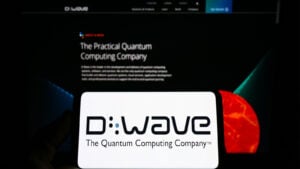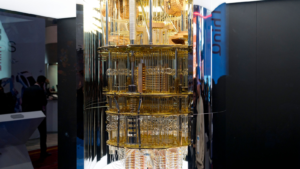Quantum computing technology and applications across sectors are advancing rapidly; the market is predicted to grow over 32% from 2023 to 2030, attracting attention toward multibagger quantum computing stocks.
Furthermore, industry developments such as IBM’s (NYSE:IBM) 433-qubit Osprey processor represent a substantial advancement in quantum computing, enabling complicated calculations beyond traditional computers.
Amidst this, an investor may wonder how to buy multibagger quantum computing stocks. Compared to IBM and Microsoft (NASDAQ:MSFT), there is huge potential for reward and a little commitment when it comes to penny stocks. Moreover, the three multibagger quantum computing stocks we shall examine promise up to triple-digit potential. Today we’re looking at stocks that offer strong gross margins, solid pioneering achievements and major quarterly performance advances.
Quantum Computing (QUBT)

Quantum Computing (NASDAQ:QUBT) creates low-cost nanophotonics-based quantum-tech industrial products.
The penny play, one of the most inexpensive multibagger quantum computing stocks, is down 15% in 2024. However, its strong gross margins of 45% are greater than 84% of its industry’s, even though the company is losing money.
Most notably, through its quantum optimization platform, Dirac-3, QUBT is a leader in the field. Another creation of QUBT is the Quantum Photonic Vibrometer. Better vibration detection, perception and analysis are possible with the first quantum-accelerated photonics vibrometer. This business and military gadget detects explosives and hidden weapons up to 30 inches below the surface.
Furthermore, the company has expanded its CRADA to include use case testing using the Dirac-1 Entropy Quantum Computer at Los Alamos National Laboratory.
The company was subcontracted by the Bay Area Environmental Research Institute to develop and test a photonic sensor for NASA Ames. This sensor enhances the company’s NASA relationship by measuring the size, form and chemistry of clouds, aerosols and volcanic ash.
A fourth NASA grant was given to QUBT to use entropy quantum computing to denoise LiDAR spectrum data. This technology is needed for NASA missions in order to provide accurate measurements for observation and exploration at any time of day.
D-Wave Quantum (QBTS)

Quantum computing gear, software and services provider D-Wave Quantum (NYSE:QBTS) reported strong revenue and bookings last quarter.
Sales rose 21% in Q4 and 22% in 2023. Q4 bookings up 34% and FY 89% year-over-year. Like QUBT, this penny stock will fluctuate.
Even though sales and bookings grew by more than 10%, QBTS didn’t do better than experts expected. Earnings per share were -0.09, which was about 10% less than expected. There was a selloff because sales were 38% lower than expected, at $2.9 million instead of $4.7 million.
Moving towards its latest tech moves, the 1,200+ qubit D-Wave Advantage2 prototype is now available via its Leap Quantum Cloud Service. This prototype’s stacked superconducting integrated circuit manufacturing stack reduces noise. Complex applications like machine learning benefit from 20 times quicker optimization.
Moreover, D-Wave demonstrated quantum spin glass flow on over 5,000 qubits. This advances its annealing and gate-type quantum computer. Advantage2 should have over 7,000 qubits.
No superconducting qubit on the market has better coherence than D-Wave’s fluxonium qubits. Gate model quantum computing systems improve fluxonium qubits. This will impact D-Wave’s quantum technology.
The consensus on QBTS stock is “Strong Buy,” and its 80% growth potential points to a rebound.
Rigetti Computing (RGTI)

The last of our top quantum computing multibaggers is Rigetti Computing (NASDAQ:RGTI). Similar to the previous two penny stocks, however, its last quarter was better than expected, giving it some brownie points.
RGTI’s sales of $3.38 million exceeded estimates by 10%. Its EPS came in at a loss of $0.04 instead of $0.06, 32% better than anticipated.
In terms of innovation, Rigetti’s 84-qubit Ankaa-2 quantum computer makes mistakes 2.5 times less often than older QPUs. This is what made it a success when it came to operation and sales. The company got 98% of the time with two qubits correctly, which means the quantum bits worked well together.
Rigetti also wants to make quantum computing easier to access by combining the 9-qubit Novera QPU with existing systems.
Internationally, Oxford Instruments NanoScience and Rigetti UK recently completed a project to construct one of the first UK quantum computers. Horizon Quantum Computing also got a Rigetti Novera QPU for a hardware testbed in Singapore so that it can grow in the Asia-Pacific region, which is the fastest-growing quantum computing market.
The upside potential is significant at 170%, with a consensus recommendation of “Strong Buy.”
On the date of publication, Faizan Farooque did not have (either directly or indirectly) any positions in the securities mentioned in this article. The opinions expressed in this article are those of the writer, subject to the InvestorPlace.com Publishing Guidelines.
